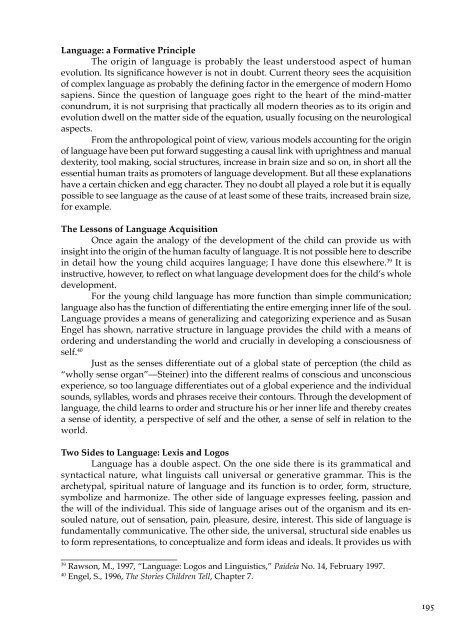The Spirit in Human Evolution - Waldorf Research Institute
The Spirit in Human Evolution - Waldorf Research Institute
The Spirit in Human Evolution - Waldorf Research Institute
You also want an ePaper? Increase the reach of your titles
YUMPU automatically turns print PDFs into web optimized ePapers that Google loves.
Language: a Formative Pr<strong>in</strong>ciple<br />
<strong>The</strong> orig<strong>in</strong> of language is probably the least understood aspect of human<br />
evolution. Its significance however is not <strong>in</strong> doubt. Current theory sees the acquisition<br />
of complex language as probably the def<strong>in</strong><strong>in</strong>g factor <strong>in</strong> the emergence of modern Homo<br />
sapiens. S<strong>in</strong>ce the question of language goes right to the heart of the m<strong>in</strong>d-matter<br />
conundrum, it is not surpris<strong>in</strong>g that practically all modern theories as to its orig<strong>in</strong> and<br />
evolution dwell on the matter side of the equation, usually focus<strong>in</strong>g on the neurological<br />
aspects.<br />
From the anthropological po<strong>in</strong>t of view, various models account<strong>in</strong>g for the orig<strong>in</strong><br />
of language have been put forward suggest<strong>in</strong>g a causal l<strong>in</strong>k with uprightness and manual<br />
dexterity, tool mak<strong>in</strong>g, social structures, <strong>in</strong>crease <strong>in</strong> bra<strong>in</strong> size and so on, <strong>in</strong> short all the<br />
essential human traits as promoters of language development. But all these explanations<br />
have a certa<strong>in</strong> chicken and egg character. <strong>The</strong>y no doubt all played a role but it is equally<br />
possible to see language as the cause of at least some of these traits, <strong>in</strong>creased bra<strong>in</strong> size,<br />
for example.<br />
<strong>The</strong> Lessons of Language Acquisition<br />
Once aga<strong>in</strong> the analogy of the development of the child can provide us with<br />
<strong>in</strong>sight <strong>in</strong>to the orig<strong>in</strong> of the human faculty of language. It is not possible here to describe<br />
<strong>in</strong> detail how the young child acquires language; I have done this elsewhere. 39 It is<br />
<strong>in</strong>structive, however, to reflect on what language development does for the child’s whole<br />
development.<br />
For the young child language has more function than simple communication;<br />
language also has the function of differentiat<strong>in</strong>g the entire emerg<strong>in</strong>g <strong>in</strong>ner life of the soul.<br />
Language provides a means of generaliz<strong>in</strong>g and categoriz<strong>in</strong>g experience and as Susan<br />
Engel has shown, narrative structure <strong>in</strong> language provides the child with a means of<br />
order<strong>in</strong>g and understand<strong>in</strong>g the world and crucially <strong>in</strong> develop<strong>in</strong>g a consciousness of<br />
self. 40<br />
Just as the senses differentiate out of a global state of perception (the child as<br />
“wholly sense organ”—Ste<strong>in</strong>er) <strong>in</strong>to the different realms of conscious and unconscious<br />
experience, so too language differentiates out of a global experience and the <strong>in</strong>dividual<br />
sounds, syllables, words and phrases receive their contours. Through the development of<br />
language, the child learns to order and structure his or her <strong>in</strong>ner life and thereby creates<br />
a sense of identity, a perspective of self and the other, a sense of self <strong>in</strong> relation to the<br />
world.<br />
Two Sides to Language: Lexis and Logos<br />
Language has a double aspect. On the one side there is its grammatical and<br />
syntactical nature, what l<strong>in</strong>guists call universal or generative grammar. This is the<br />
archetypal, spiritual nature of language and its function is to order, form, structure,<br />
symbolize and harmonize. <strong>The</strong> other side of language expresses feel<strong>in</strong>g, passion and<br />
the will of the <strong>in</strong>dividual. This side of language arises out of the organism and its ensouled<br />
nature, out of sensation, pa<strong>in</strong>, pleasure, desire, <strong>in</strong>terest. This side of language is<br />
fundamentally communicative. <strong>The</strong> other side, the universal, structural side enables us<br />
to form representations, to conceptualize and form ideas and ideals. It provides us with<br />
_________________________<br />
39<br />
Rawson, M., 1997, “Language: Logos and L<strong>in</strong>guistics,” Paideia No. 14, February 1997.<br />
40<br />
Engel, S., 1996, <strong>The</strong> Stories Children Tell, Chapter 7.<br />
195
















